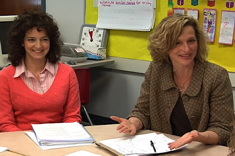In the closing moments of professional development sessions, how do you leave participants inspired and commited to making changes in their classrooms? We asked Choice Literacy contributors to share some of their favorite closing activities for sessions with colleagues.
Aimee Buckner, author of Notebook Know-How and Notebook Connections
:
Whether you’re writing a chapter or wrapping up a professional learning session, endings are difficult. I try to reserve the last half hour of workshops with teachers for reflection and planning. I’ll ask participants to turn to a partner and discuss:
1. What specifically do you want to do differently in your classroom? (If there is a follow up session planned, I’ll ask for an update the next meeting.)
2. What do you want to share with your grade level (or colleagues) who didn’t attend?
Then after they’ve figured these two things out, I have them practice the second item — sharing with their grade-level colleagues. Often people don’t really think through what they’re going to say and they leave excited. However, when they start explaining things to their colleagues, the ideas don’t always seem to fit or sound as good as they did in the meeting. Practicing exactly what you’re going to say, or how you’ll explain it to colleagues, helps teachers find out what they misunderstood, don’t quite fully understand, and what they need to think more about before sharing. The benefit of practicing before they leave is that they have a colleague there who just heard the same thing to help them. Plus, I can help clarify any ideas or answer any questions before they go.
I also ask them to plan what they’re going to do differently in their classrooms. If a teacher says she’s going to try reading aloud each day, then I want her to look at her schedule and commit to a time she’ll read aloud. If a teacher says he’s going to have his kids write in their notebooks each day, then I want him to determine when they’ll write — specifically — and which strategies he’ll start with. Solidifying a plan before teachers leave the session empowers teachers to implement rather than just think about implementing a plan of action.
Heather Rader, literacy coach in Washington state:
Because teachers are engaged in individual, partner and small-group work with colleagues in the professional development I facilitate, they don’t always get to “read the room” to get a sense of the group experience. There are three closers I like that bring a sense of wholeness and humanness at the end of our time together.
“Stand Up and Say Something” is as simple as it sounds. Each person selects a line from the reading, a connection to their teaching, or a question. Then one person stands up and says something. Without predetermining who goes next, another person stands up, and then another. Often they use transitions like, “Well, that’s almost exactly what I was going to say” or “To piggy back on what he said . . .” The experience of everyone standing up for their learning at the close of a professional development session is powerful.
“One Word” (or phrase): When I’m running short on time, I ask everyone to think of a word from the session, a feeling they are having, or something that’s up for them at the close of the workshop. They can write these words large enough to hold up on a page, or say them out loud. “Inspired,” “Tired,” “Assessment,” “More Nonfiction,” “Helpful,” and “Curious” leave the group with a sense of the whole, as well as a feeling of validation for each individual participant.
“It Matters to . . .”: All of the professional development we do is about kids having a better and deeper experience of learning. This activity is about naming which students will benefit from what we’ve learned. For example, if I’m wrapping up a course on elementary writing workshops, I ask teachers to contemplate what they’ve learned and select the name of one student for whom it will really matter. Each teacher takes a turn to say the name aloud. I get chills when I hear: Marisa, Jorge, Claire, Gabe, Talon, Tre, Angela. Since I work in thirteen different schools I don’t know all of these children, but we feel as though they’ve been with us there in the room all along.
Jennifer Allen, literacy specialist and author of Becoming a Literacy Leader: Supporting Learning and Change and A Sense of Belonging: Sustaining and Retaining New Teachers
:
I want professional development to feel like ongoing conversations with colleagues from session to session, especially now when we are halfway through the school year. It’s the time of year that teachers have collected a lot of information on their students, from both formal and informal assessments. I find this is the time of year that I work with teachers to triangulate their data. By taking the various data collected over the course of the year and looking at the story that it tells us about each and every student, teachers feel prepared to share the information with families at parent/teacher conferences in March. It gives meaning and purpose behind the assessments that we administer, and it puts state testing in perspective.
These moments remind us the state tests are just simply one data point, one measure of achievement, in a sea of data that we have about our students. I tend to close with simply asking the group to pause for a moment and think about what it is they are thinking about or would like to put into practice. This reinforces the idea that professional development is an extended opportunity for colleagues to make meaning together.


